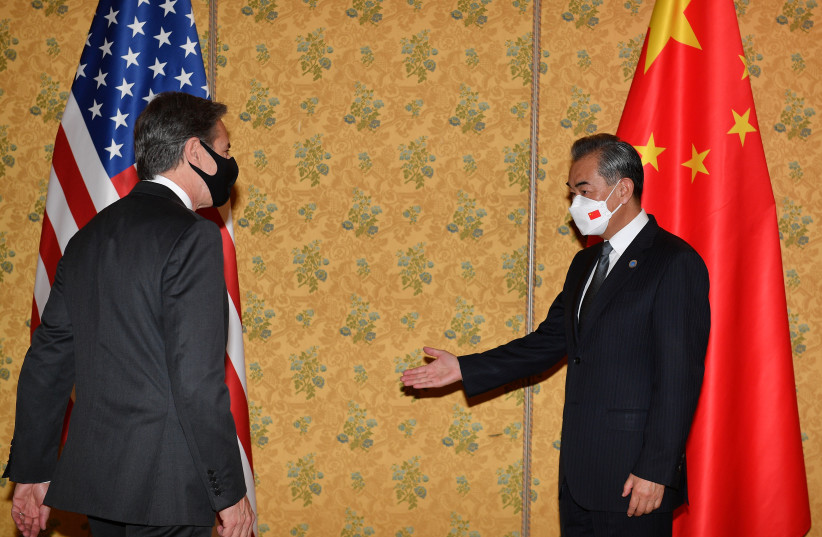The US is concerned because UN High Commissioner for Human Rights Michelle Bachelet has traveled to China and been accused of whitewashing human-rights abuses. A Washington Post op-ed said the UN has become a “tool of China’s genocide denial.”
While Bachelet did urge Beijing to review counterterrorism policies, overall, the visit has been conducted without any ruffled feathers in Beijing. In addition, COVID has been used as an excuse – as many countries have used it as an excuse over the past years – to control and curtail the visit.
Washington said it “remains concerned” about Bachelet’s trip, CNN reported.
“Bachelet started her China trip, the first by a UN human rights high commissioner in 17 years, on Monday in the southern city of Guangzhou before heading to Xinjiang,” the report said. “Her office said last year it believed Uyghurs in Xinjiang had been unlawfully detained, mistreated and forced to work. ‘I have raised questions and concerns about the application of counterterrorism and deradicalization measures under broad application, particularly the impact on the rights of Uyghurs and other predominantly Muslim minorities,’ she said Saturday.”
China has said it doesn’t need any human-rights preaching from the West or outsiders. That leaves the US to merely sit and complain.

"We are concerned the conditions Beijing authorities imposed on the visit did not enable a complete and independent assessment of the human rights environment in [China], including in Xinjiang, where genocide and crimes against humanity are ongoing,"
US Secretary of State Antony Blinken
“We are concerned the conditions Beijing authorities imposed on the visit did not enable a complete and independent assessment of the human rights environment in [China], including in Xinjiang, where genocide and crimes against humanity are ongoing,” US Secretary of State Antony Blinken said in a statement. “The High Commissioner should have been allowed confidential meetings with family members of Uyghur and other ethnic minority diaspora communities in Xinjiang who are not in detention facilities but are forbidden from traveling out of the region,” he said.
The visit to China has underlined how the West has lost much of the bureaucratic struggle over human-rights issues. While Western media and governments still play an outsized role in setting the narrative regarding human rights, overall, it is the authoritarian regimes that have learned how to take control of institutions and shield themselves from critique.
Whether it is Iran, North Korea, Cuba, China, Russia or Turkey, all the authoritarian regimes know they have to work together at the UN and other forums to make sure they control not only the human-rights committees and groups, but that they choose the judges and those who oversee human-rights reports.
Which human rights are worth paying attention to?
THIS CONTROL, like an old-boys network controlling any oversight of insider trading, means that human-rights rules have largely been outsourced to Moscow, Beijing, Tehran and Ankara. That is why protests in Iran get no notice and why Turkey can openly threaten invasion and ethnic cleansing of Syria, and no one says anything.
Ankara’s role in Syria, for instance, is as bad as the ethnic cleansing in the Balkans in the 1990s. But no one has stood up to Turkey. Russia and China often work together at the UN Security Council to block any condemnation of authoritarian regimes. This is why Russia likely won’t face any investigation about its abuses in Ukraine. China has easily silenced dissidents in Hong Kong.
China knows it is on the winning side in the human-rights bureaucracy.
“The US, Britain and other Western countries have been repeatedly staging political farces around the UN high commissioner for human rights’ visit to China,” Chinese Foreign Ministry spokesman Wang Wenbin said.
“The US, Britain and other Western countries have been repeatedly staging political farces around the UN high commissioner for human rights’ visit to China.”
Chinese Foreign Ministry spokesperson Wang Wenbin
China and the Catholic Church
China has reined in any human-rights critique, and it is also working with the Catholic Church to end critique of China.
“For the first time in 33 years, church services to commemorate the Tiananmen Square crackdown will not be held in Hong Kong, erasing one of the last reminders of China’s bloody suppression of the 1989 protests,” The Guardian reported Monday.
“The annual Catholic masses were one of the last ways for Hong Kongers to come together publicly to remember the deadly clampdown in Beijing on 4 June 1989, when the Chinese government set tanks and troops on peaceful demonstrators,” the report said.
The Vatican, apparently preferring to work with Russia than Western democracies, has also been careful in its critique of the Russian invasion of Ukraine. This is in stark contrast to Pope John Paul II, who stood up to the Soviet Union.
The degree to which authoritarian regimes today run human rights at the UN and other forums is a major break with the past.
Human rights also becomes the tool that authoritarian regimes use against their adversaries, repackaging the concepts that were pushed by Western democracies, so that they can be used at various international forums on issues such as women’s rights or children’s rights.
